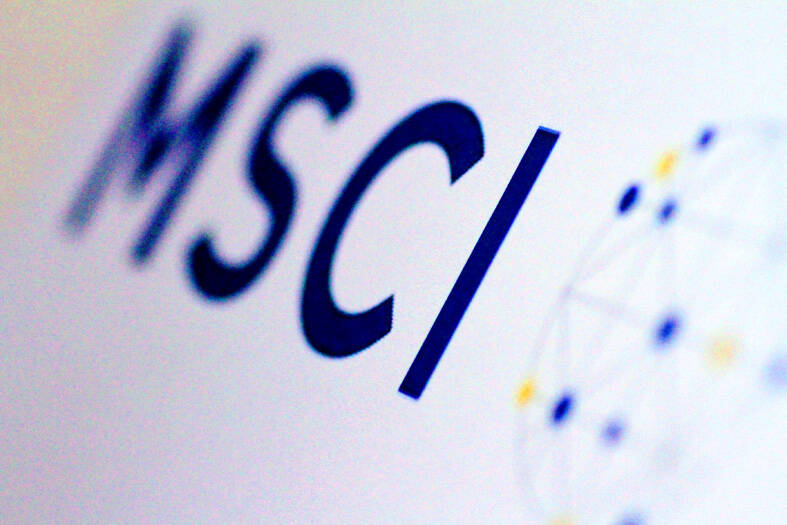Global index provider MSCI Inc said on Thursday it had raised Taiwan’s weighting in the MSCI All-Country World Index by 0.01 percentage points to 1.94 percent, but cut the country’s weighting in the MSCI All-Country Asia ex-Japan Index by 0.03 percentage points to 21.25 percent after a regular review.
Meanwhile, the nation’s weighting in the MSCI Emerging Markets Index was left unchanged at 18.70 percent, which is closely watched by foreign institutional investors.
MSCI index reviews are conducted in February, May, August and November every year, with indexes in US dollar terms provided to professional investors to help guide their portfolio adjustments.

Photo: Reuters
The latest index adjustments are scheduled to take effect after the market closes on Nov. 25.
It also added International Games System Co (鈊象電子), a Taiwanese game software developer, and Jentech Precision Industrial Co (健策精密), a Taiwan-based metal stamping services provider, to the MSCI Global Standard Indexes.
The inclusion of the two stocks largely reflected the gains in their share prices in recent sessions, analysts said.
Before yesterday, shares of International Games System had soared more than 39 percent on the over-the-counter market since the beginning of August, while shares of Jentech Precision had also surged about 30.60 percent on Taiwan’s main stock exchange.
MSCI removed DRAM chip supplier Winbond Electronics Corp (華邦電子) from the MSCI Global Standard Indexes, but added it to the MSCI Global Small Cap Indexes.
Meanwhile, it also added 10 additional Taiwanese stocks to the MSCI Global Small Cap Indexes, including machinery brand All Ring Tech Co (萬潤科技), high-precision planetary gearbox provider Apex Dynamics Inc (台灣精銳科技), semiconductor material supplier Daxin Materials Corp (達興材料), optical interface developer EZconn Corp (光紅建聖), semiconductor inspection equipment maker Gallant Precision Machining Co (均豪精密) and optoelectronic lead frame producer I-Chiun Precision Industry Co (一詮精密).
MSCI removed 23 Taiwanese stocks from the MSCI Global Small Cap Indexes, including vaccine brand Adimmune Corp (國光生技), radio frequency front-end devices and module maker Advanced Ceramic X Corp (璟德電子), drug developer Alar Pharmaceuticals Inc (昱展新藥), Asia Polymer Corp (亞洲聚合), dumpling brand Bafang Yunji International Co (八方雲集), flexible printed circuit board maker Career Technology Manufacturing Co (嘉聯益) and skincare product provider Chlitina Holding Ltd (麗豐).
After the index review, the number of constituents on the MSCI Taiwan Index rose to from 87 to 88, the index provider said.
International Game System saw its weighting in the MSCI Taiwan Index increase by 0.53 percentage points, the largest hike among the index’s 88 constituents, while the weighting of Taiwan Semiconductor Manufacturing Co (台積電) was reduced by 0.39 percentage points, the steepest cut, to 52.48 percent.

RUN IT BACK: A succesful first project working with hyperscalers to design chips encouraged MediaTek to start a second project, aiming to hit stride in 2028 MediaTek Inc (聯發科), the world’s biggest smartphone chip supplier, yesterday said it is engaging a second hyperscaler to help design artificial intelligence (AI) accelerators used in data centers following a similar project expected to generate revenue streams soon. The first AI accelerator project is to bring in US$1 billion revenue next year and several billion US dollars more in 2027, MediaTek chief executive officer Rick Tsai (蔡力行) told a virtual investor conference yesterday. The second AI accelerator project is expected to contribute to revenue beginning in 2028, Tsai said. MediaTek yesterday raised its revenue forecast for the global AI accelerator used

Taiwan Semiconductor Manufacturing Co (TSMC, 台積電) has secured three construction permits for its plan to build a state-of-the-art A14 wafer fab in Taichung, and is likely to start construction soon, the Central Taiwan Science Park Bureau said yesterday. Speaking with CNA, Wang Chun-chieh (王俊傑), deputy director general of the science park bureau, said the world’s largest contract chipmaker has received three construction permits — one to build a fab to roll out sophisticated chips, another to build a central utility plant to provide water and electricity for the facility and the other to build three office buildings. With the three permits, TSMC

TEMPORARY TRUCE: China has made concessions to ease rare earth trade controls, among others, while Washington holds fire on a 100% tariff on all Chinese goods China is effectively suspending implementation of additional export controls on rare earth metals and terminating investigations targeting US companies in the semiconductor supply chain, the White House announced. The White House on Saturday issued a fact sheet outlining some details of the trade pact agreed to earlier in the week by US President Donald Trump and Chinese President Xi Jinping (習近平) that aimed to ease tensions between the world’s two largest economies. Under the deal, China is to issue general licenses valid for exports of rare earths, gallium, germanium, antimony and graphite “for the benefit of US end users and their suppliers

Dutch chipmaker Nexperia BV’s China unit yesterday said that it had established sufficient inventories of finished goods and works-in-progress, and that its supply chain remained secure and stable after its parent halted wafer supplies. The Dutch company suspended supplies of wafers to its Chinese assembly plant a week ago, calling it “a direct consequence of the local management’s recent failure to comply with the agreed contractual payment terms,” Reuters reported on Friday last week. Its China unit called Nexperia’s suspension “unilateral” and “extremely irresponsible,” adding that the Dutch parent’s claim about contractual payment was “misleading and highly deceptive,” according to a statement